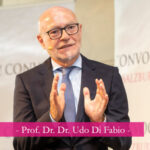Read our Convoco thinkers’ thoughts on the topic of:
How are freedom and democracy interdependent?
Why democracy is the government system of freedom

Freedom’s system of government is democracy … Only in democracy can there be individual and collective autonomy … Experience shows that individual legal interests are always threatened in non-democratic societies. (Edition 2022)
Freedom and democracy depend on one another, but they can also threaten one another. (Edition 2022)
Democracy can become a threat to freedom. The majority principle is a central rule in democratic decision-making. This very principle, however, can lead to the tyranny of the majority, to the outvoting of minorities, and to an abuse of free, collective decision-making to the detriment of individual groups. (Edition 2022)

Authority is often equated with heteronomy – the individual’s subjection to an external force or will, and the opposite of autonomy. However, if authority is based on broad consensus, there exists a benign relationship of cooperation between authority and freedom. Freedom can only be enjoyed under certain general conditions. It is the task of authority to set these conditions so that freedom can be maintained. A loss of authority does not automatically correspond to a gain in freedom. Authority does not necessarily act in opposition to freedom. (Edition 2017)

While freedom is a supreme good, one should not make it absolute … The German Constitution is aware of that, it allows plenty of room for restrictions on freedom – with the exception of human dignity. The mothers and fathers of the Basic Law, who had experienced the war, knew that freedom cannot be all that matters. (Podcast)
Inequality is the necessary consequence of freedom … But how much inequality are we able and willing to allow? … That is precisely what the democratic process is about because it typically involves justified restrictions on freedom. (Forum 2022)
Can there be freedom without democracy?

The congruence of freedom and democracy is an experience of the present. Historically, we have seen very complicated mixtures which may warn us against believing that freedom and democracy must be thought of as one in order for a community to function. (Forum 2021)

Freedom is a prerequisite for democracy. Democracy must facilitate freedom but it is also depends on it. There may be individual freedoms in non-democratic states,but the question is whether one considers that desirable. (Forum 2021)
Challenges for democracy

We are now more than ever in an era of renewed rivalry between the superpowers … From a global perspective, it seems that liberal, constitution-based, democratic states are currently experiencing a downturn, while authoritarian states are increasing in number. (Edition 2022)

Authoritarian, repressive systems, led by a strong central power, and which are economically relatively successful, are thus becoming a popular alternative model to Western liberal systems—popular even in the most elevated circles of Western society. (Edition 2022)

Western values have never been more threatened than they are today. They are not only attacked in autocracies, but in Europe itself. The belief in the supremacy of Western values – liberalism, free trade, democracy, rationality – is fading. (Forum 2022)
Democracy is currently challenged by nine fields of change. Six of them describe changes in democracy and how it works and manifests as such, namely: democratic deconsolidation, populism, democratic backsliding, technocracy, new movements, and democratic innovations. Three other fields describe decisive changes in the societal context of democracy: the tendency towards a two-thirds society, digitalization, and the globalization trilemma. (Edition 2023)
How resilient is democracy?

The new geopolitical alliances force us to rethink. The democracies will have to invest more in themselves, in the vitality and functionality of their states, so that they can invest in the application of human rights and in the public goods of humanity worldwide. (Edition 2021)

- [Improve citizens’ satisfaction with policy]: decreasing the effects of inflation and a lack of energy support by targeted support and redistributive politics.
- Economic inequality and social divisions challenge democratic equality and the stability of democracies … This again invites to counteract economic inequality with redistributive policies, social services, and in particular education. [Governments should] regulate digital public spaces and render access to them as equal as possible.
- People whose experience is that their political action matters show a greater support for democracy. This is a task for authorities … to do democracy, and to take along as many people as possible. (Edition 2023)

Putin is currently testing the resiliency of democracies under stressful conditions. (Forum 2022)
Wars are always periods in which autocrats tend to surround themselves with people who tell them what they want to hear. They detach themselves from reality. Additionally, there is the disadvantage of a lack of ‘checks and balances’. Authoritarian systems are less capable of learning. This is the advantage of deliberative democracies. Democracies may be tedious, but looking back at the two World Wars, I do not believe their victory is coincidental. (Forum 2022)

The notion of individual freedom is persistent… Liberalism may be in retreat or in defense, but it will always be there to trouble authoritarian systems and to compete with them. (Podcast)
